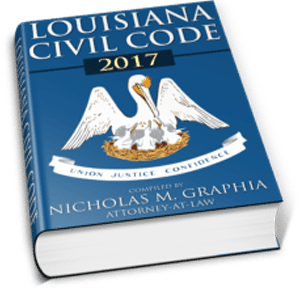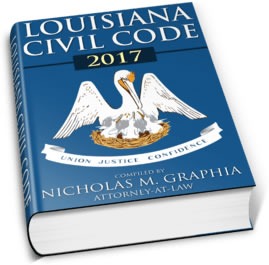 In 2016 the Louisiana Legislature amended or enacted 14 Civil Code articles. 1 Article was repealed. The amended articles consist of articles 189, 191, 195, 196, 256, 261, 355, 1522, 2995, 3367, and 3493.10. Article 3275 was repealed. Articles 1493.1, 2997(7), and 3496.2 were enacted. Copies of the newly amended and enacted articles are below. Also, attached are copies of the Legislature’s acts that made the changes.
In 2016 the Louisiana Legislature amended or enacted 14 Civil Code articles. 1 Article was repealed. The amended articles consist of articles 189, 191, 195, 196, 256, 261, 355, 1522, 2995, 3367, and 3493.10. Article 3275 was repealed. Articles 1493.1, 2997(7), and 3496.2 were enacted. Copies of the newly amended and enacted articles are below. Also, attached are copies of the Legislature’s acts that made the changes.
These changes are incorporated in our edition of the 2017 Louisiana Civil Code. Copies are available through www.GulfCoastLegalPublishing.com and Amazon.
Art. 189. Time limit for disavowal by the husband
The action for disavowal of paternity is subject to a liberative prescription of one year. This prescription commences to run from the day of the birth of the child, or the day the husband knew or should have known that he may not be the biological father of the child, whichever occurs later.
Nevertheless, if the husband lived separate and apart from the mother continuously during the three hundred days immediately preceding the birth of the child, this prescription does not commence to run until the husband is notified in writing that a party in interest has asserted that the husband is the father of the child.
Amended by Acts 1976, No. 430, §1; Acts 1999, No. 790, §1; Acts 2005, No. 192, §1, eff. June 29, 2005; Acts 2016, No. 309, §1.
Art. 191. Contestation and establishment of paternity by mother
The mother of a child may institute an action to establish both that her former husband is not the father of the child and that her present husband is the father. This action may be instituted only if the present husband has acknowledged the child by authentic act.
Acts 2004, No. 530, §1, eff. June 25, 2004; Acts 2005, No. 192, §1, eff. June 29, 2005; Acts 2016, No. 309, §1.
SUBSECTION B. PRESUMPTION OF PATERNITY BY SUBSEQUENT
MARRIAGE AND ACKNOWLEDGMENT
Art. 195. Presumption by marriage and acknowledgment; child not filiated to another man; proof; time period
A man who marries the mother of a child not filiated to another man and who, with the concurrence of the mother, acknowledges the child by authentic act is presumed to be the father of that child.
The husband may disavow paternity of the child as provided in Article 187. Revocation of the authentic act of acknowledgment alone is not sufficient to rebut the presumption of paternity created by this Article.
The action for disavowal is subject to a peremptive period of one hundred eighty days. This peremptive period commences to run from the day of the marriage or the acknowledgment, whichever occurs later.
Acts 2005, No. 192, §1, eff. June 29, 2005; Acts 2009, No. 3, §3, eff. June 9, 2009; Acts 2016, No. 309, §1.
SUBSECTION C. OTHER METHODS OF ESTABLISHING PATERNITY
Art. 196. Formal acknowledgment; presumption
A man may, by authentic act, acknowledge a child not filiated to another man. The acknowledgment creates a presumption that the man who acknowledges the child is the father. The presumption can be invoked only on behalf of the child. Except as otherwise provided in custody, visitation, and child support cases, the acknowledgment does not create a presumption in favor of the man who acknowledges the child.
Acts 2005, No. 192, §1, eff. June 29, 2005; Acts 2006, No. 344, §1, eff. June 13, 2006; Acts 2009, No. 3, §3, eff. June 9, 2009; Acts 2016, No. 309, §1.
Art. 256. Children born outside of marriage
- The mother is of right the tutrix of her child born outside of marriage not acknowledged by the father, or acknowledged by him without her concurrence.
- After the death of the mother, if the father had not acknowledged the child prior to the mother’s death, the court shall give first consideration to appointment as tutor either of her parents or siblings who survive her and accept the appointment, and secondly, the father, always taking into consideration the best interests of the child.
- If both parents have acknowledged their child born outside of marriage, the judge shall appoint as tutor the one by whose care the best interests of the child will be served. However, if the parents are awarded joint custody of such acknowledged child born outside of marriage, then the cotutorship of such child shall belong of right to both parents, with equal authority, privileges, and responsibilities, unless modified by order of the court or by an agreement of the parents, approved by the court awarding joint custody.
Acts 1983, No. 215, §1, eff. Sept. 1, 1983; Acts 2016, No. 210, §1.
Art. 261. Child born outside of marriage
The father or mother who is entitled to the tutorship of the child born outside of marriage, according to the provisions of Article 256, can choose a tutor for him, whose appointment, to be valid, must be approved by the judge.
Amended by Acts 1979, No. 607, §1; Acts 2016, No. 210, §1.
Art. 355. Petition for continuing or permanent tutorship
When a person above the age of fifteen possesses less than two-thirds of the intellectual functioning of a person of the same age with average intellectual functioning, evidenced by standard testing procedures administered by competent persons or other relevant evidence acceptable to the court, the parents of such person, or the person entitled to custody or tutorship if one or both parents are dead, incapacitated, or an absent person, or if the parents are judicially separated or divorced, may, with the concurrence of the coroner of the parish of the intellectually disabled person’s domicile, petition the court of that district to place such person under a continuing tutorship which shall not automatically end at any age but shall continue until revoked by the court of domicile. The petitioner shall not bear the coroner’s costs or fees associated with securing the coroner’s concurrence.
Added by Acts 1966, No. 496, §2. Amended by Acts 1974, No. 714, §1; Acts 1991, No. 107, §1; Acts 2016, No. 115, §1.
Art. 1493.1. Children conceived through donation of gametes
Any child conceived from the use of gametes donated by an individual shall not be deemed a forced heir of that individual, unless the individual would be an ascendant of first or second degree notwithstanding the donation of genetic material through an in vitro fertilization process.
Acts 2016, No. 495, §1.
Art. 1522. Separate donations of usufruct and naked ownership
A disposition inter vivos or mortis causa by which the usufruct is given to one person and the naked ownership to another is not a prohibited substitution.
Acts 2016, No. 86, §1.
Art. 2995. Incidental, necessary, or professional acts
The mandatary may perform all acts that are incidental to or necessary for the performance of the mandate.
The authority granted to a mandatary to perform an act that is an ordinary part of his profession or calling, or an act that follows from the nature of his profession or calling, need not be specified.
A mandatary shall not prevent or limit reasonable communication, visitation, or interaction between a principal who is over the age of eighteen years and another person without prior court approval, to be granted only upon a showing of good cause by the mandatary, unless express authority has been provided pursuant to Article 2997(7).
Acts 1997, No. 261, §1, eff. Jan. 1, 1998; Acts 2016, No. 110, §1, eff. May 19, 2016.
Art. 2997. Express authority required
Authority also must be given expressly to:
(1) Make an inter vivos donation, either outright or to a new or existing trust or other custodial arrangement, and, when also expressly so provided, to impose such conditions on the donation, including, without limitation, the power to revoke, that are not contrary to the other express terms of the mandate.
(2) Accept or renounce a succession.
(3) Contract a loan, acknowledge or make remission of a debt, or become a surety.
(4) Draw or endorse promissory notes and negotiable instruments.
(5) Enter into a compromise or refer a matter to arbitration.
(6) Make health care decisions, such as surgery, medical expenses, nursing home residency, and medication.
(7) Prevent or limit reasonable communication, visitation, or interaction between the principal and a relative by blood, adoption, or affinity within the third degree, or another individual who has a relationship based on or productive of strong affection.
Amended by Acts 1981, No. 572, §1; Acts 1990, No. 184, §1; Acts 1992, No. 304, §1; Acts 1997, No. 261, §1, eff. Jan. 1, 1998; Acts 2001, No. 594, §1; Acts 2016, No. 110, §1, eff. May 19, 2016.
Art. 3275. Repealed by Acts 2016, No. 227, §2.
Art. 3367. Cancellation of recordation after effect of recordation has ceased
If the effect of recordation of a mortgage, pledge, or privilege has ceased for lack of reinscription or has prescribed by lapse of time under R.S. 9:5685, the recorder upon receipt of a written signed application shall cancel its recordation.
Acts 2005, No. 169, §1, eff. Jan. 1, 2006; Acts 2005, 1st Ex. Sess., No. 13, §1, eff. Nov. 29, 2005; Acts 2014, No. 281, §1, eff. Jan. 1, 2015; Acts 2016, No. 76, §1.
NOTE: Acts 2005, 1st Ex. Sess., No. 13, §1, changed the effective date of Acts 2005, No. 169, to July 1, 2006.
SECTION 1-A. TWO-YEAR PRESCRIPTION
Art. 3493.10. Delictual actions; two-year prescription; criminal act
Delictual actions which arise due to damages sustained as a result of an act defined as a crime of violence under Chapter 1 of Title 14 of the Louisiana Revised Statutes of 1950, except as provided in Article 3496.2, are subject to a liberative prescription of two years. This prescription commences to run from the day injury or damage is sustained.
Acts 1999, No. 832, §1; Acts 2016, No. 629, §1.
Art. 3496.2. Action against a person for sexual assault
A delictual action against a person for any act of sexual assault, as defined in R.S. 46:2184, is subject to a liberative prescription of three years. This prescription commences to run from the day the injury or damage is sustained or the day the victim is notified of the identity of the offender by law enforcement or a judicial agency, whichever is later. This prescriptive period shall be subject to any exception of peremption provided by law.
Acts 2016, No. 629, §1.

